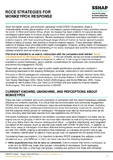| dc.contributor.author | Schmidt-Sane, Megan | |
| dc.contributor.author | Abbas, Syed | |
| dc.contributor.author | Karam, Soha | |
| dc.contributor.author | Palmer, Jennifer | |
| dc.date.accessioned | 2022-06-16T08:36:03Z | |
| dc.date.available | 2022-06-16T08:36:03Z | |
| dc.date.issued | 2022-06 | |
| dc.identifier.citation | Schmidt-Sane, M.; Abbas, S.; Karam, S. and Palmer, J. (2022) RCCE Strategies for Monkeypox Response, Social Science in Humanitarian Action Platform (SSHAP), DOI: 10.19088/SSHAP.2022.020 | en |
| dc.identifier.uri | https://opendocs.ids.ac.uk/opendocs/handle/20.500.12413/17471 | |
| dc.description.abstract | Given the health, social, and economic upheavals of the COVID-19 pandemic, there is understandable anxiety about another virus, monkeypox, quickly emerging in many countries around the world. In West and Central Africa, where the disease has been endemic for several decades, monkeypox transmission in humans usually occurs in short, controllable chains of infection after contact with infected animal reservoirs. Recent monkeypox infections have been identified in non-endemic regions, with most occurring through longer chains of human-to-human spread in people without a history of contact with animals or travel to endemic regions. These seemingly different patterns of disease have prompted public health investigation. However, ending chains of monkeypox transmission requires a better understanding of the social, ecological and scientific interconnections between endemic and non-endemic areas.
This brief is intended to be read in conjunction with the companion brief entitled ‘Social Considerations for Monkeypox Response’.1 In this set of briefs, we lay out social considerations from previous examples of disease emergence to reflect on 1) the range of response strategies available to control monkeypox, and 2) specific considerations for monkeypox risk communication and community engagement (RCCE).
These briefs are intended to be used by public health practitioners and advisors involved in developing responses to the ongoing monkeypox outbreak, particularly in non-endemic countries.
This brief on RCCE strategies for monkeypox response was written by Megan Schmidt-Sane (IDS), Syed Abbas (IDS), Soha Karam (Anthrologica), and Jennifer Palmer (LSHTM), with contributions from Hayley MacGregor (IDS), Olivia Tulloch (Anthrologica), and Annie Wilkinson (IDS). It was reviewed by Will Nutland (The Love Tank CIC/PrEPster) and was edited by Victoria Haldane (Anthrologica). This brief is the responsibility of SSHAP. | en |
| dc.description.sponsorship | Foreign, Commonwealth & Development Office (FCDO) | en |
| dc.description.sponsorship | Wellcome Trust | en |
| dc.language.iso | en | en |
| dc.publisher | SSHAP | en |
| dc.rights | http://creativecommons.org/licenses/by/4.0/ | en |
| dc.rights.uri | http://creativecommons.org/licenses/by/4.0/ | en |
| dc.subject | Health | en |
| dc.title | RCCE Strategies for Monkeypox Response | en |
| dc.type | Series paper (non-IDS) | en |
| dc.rights.holder | SSHAP | en |
| dc.identifier.team | Health and Nutrition | en |
| dc.identifier.doi | 10.19088/SSHAP.2022.020 | |
| dcterms.dateAccepted | 2022-06 | |
| rioxxterms.funder | Default funder | en |
| rioxxterms.identifier.project | Default project | en |
| rioxxterms.version | VoR | en |
| rioxxterms.versionofrecord | 10.19088/SSHAP.2022.020 | en |
| rioxxterms.funder.project | c941507f-fd0b-4fc3-9822-4b2132f61a1d | en |


